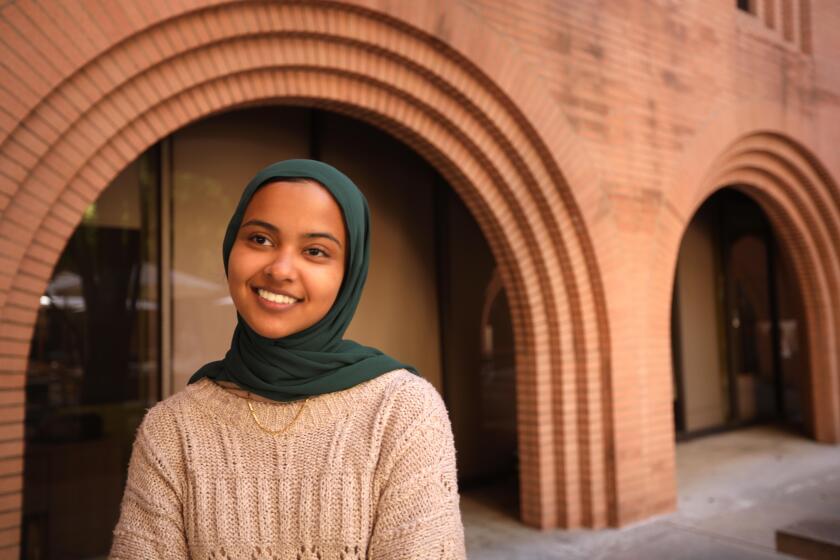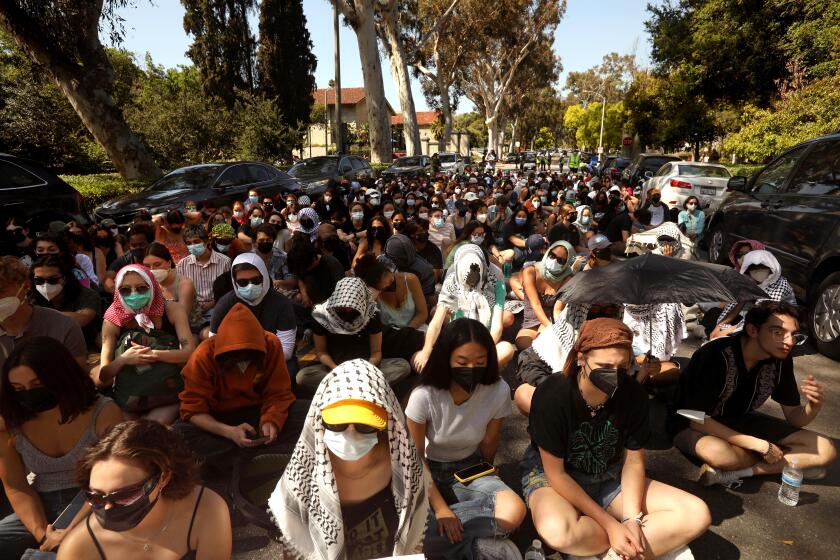‘We will not move.’ Pro-Palestinian encampments, protests grow at California universities

- Share via
BERKELEY — Pro-Palestinian protests swept across California colleges and universities Tuesday as tensions grew nationwide amid an expanding student-led movement that has pitted administrators and police against young activists and intensified the debate over the line between campus free speech and antisemitism.
At UC Berkeley, students have set up dozens of tents in front of Sproul Plaza — the historic hub of the campus free speech movement. They vowed to face arrest as they demanded the university divest from investments in weapons manufacturers tied to Israel’s war in Gaza.
At Cal Poly Humboldt, administrators shut down the Arcata campus through Wednesday and moved classes online after dozens of students barricaded themselves with chairs in an administration building and police made overnight arrests.
Asna Tabassum was selected as USC valedictorian and offered a slot to speak at graduation. The university canceled her speech after pro-Israel groups criticized her Instagram.
And at USC, students said they planned to erect tents Wednesday at the center of campus. The school has been embroiled in controversy after canceling a pro-Palestinian valedictorian’s commencement speech amid accusations that she promoted antisemitism on social media.
“We are in solidarity with students speaking up everywhere,” said Malak Afaneh, a UC Berkeley law student who is part of the “Free Palestine Camp.”
“We put up tents because that is how Palestinians are living now. We will not move until Berkeley divests,” said Afaneh, who is Palestinian American.
Tensions have grown at colleges since the Oct. 7 Hamas-led attack on Israel, which killed 1,200 people; in addition, about 240 hostages were taken before Israel began its retaliatory war in the Gaza Strip. Gaza health authorities say the war has killed more than 34,000 Palestinians. According to the United Nations, 2 million Gazans are in near-famine conditions.
The unrest, which has spread to more than a dozen American campuses from Massachusetts to California, was kindled last week after Columbia University President Nemat Shafik called in police to arrest at least 100 students who refused to leave a sprawling encampment there. Shafik made the move after fielding accusations about campus antisemitism at a Republican-led congressional committee hearing on April 17 in Washington, D.C.
Instead of cooling tensions, the decision further inflamed the campus. Jewish students, pointing to posters and statements made on and near campus that supported the Oct. 7 Hamas attack on Israel, said the university has become unsafe. Those statements were widely documented via photos and videos. But firsthand accounts from news outlets of the Columbia demonstration said it has been largely peaceful.
Now, tent camps in support of the “boycott, divestment and sanctions” movement against Israel have popped up at New York, Vanderbilt and Yale universities. Police have made arrests at NYU and cleared a camp at Yale, arresting 60 protesters. Columbia has canceled in-person classes, and, at Harvard University, the typically open gates to Harvard Yard were scheduled to be closed to the public through at least Friday.
High schools, including several in the Seattle region, also took part by staging walkouts Tuesday. Stanford University joined in Tuesday as local media reported hundreds of students gathering at Memorial Church in the center of campus for a “solidarity march” with Palestinians and American university activists. The event was organized by Stanford Against Apartheid in Palestine, a group that previously staged a 120-day pro-Palestinian tent sit-in on campus that ended in February when university officials removed the structure and banned overnight camping.
The national Students for Justice in Palestine organization has called for more encampments and rallies, posting on its Instagram account, “Disclose. Divest. We will not stop. We will not rest.”
On Wednesday, a smattering of protesters gathered by the landmark Tommy Trojan statue, some calling on USC President Carol Folt to reverse course as arguments broke out between those on opposing sides.
Students are asking for a permanent cease-fire in Gaza, an end to U.S. military aid to Israel and for universities to sign on to the boycott, divestment and sanctions movement. They want universities to pull endowment investments from corporations that manufacture weapons used in Gaza and other military equipment, such as checkpoint technology in the West Bank. National Jewish organizations have called the BDS movement antisemitic because they say it aims to isolate and delegitimize the only Jewish nation.
Some of the most strident activism has been at UC Berkeley, where tents multiplied overnight Monday from an initial dozen.
About 50 tents remained on the lawn and steps outside Sproul Hall on Tuesday. Palestinian flags decorated the tent neighborhood. A banner hung over the entrance to the building declaring, “An injury to Gaza is an injury to all.”
Dozens of students and community members were milling about the tents and sitting on the steps outside the building. Many wore kaffiyehs, traditional scarves that have come to symbolize support for Palestinians.
The Muslim Student Assn. had set up a table to pass out fliers and brochures, while a large white board displaying the demands of a coalition of dozens of student groups behind the protest stood prominently next to the tents. In addition to divestment, the demands included support for an academic boycott that would sever ties and collaboration with Israeli universities. The coalition also called for policies that “protect the safety and academic freedoms of Palestinian students and their allies,” including the creation of a Palestinian studies program.
“People are choosing this and are choosing to do this because they know that they cannot be complicit in this genocide. They know that they have to use their voices, they have to put their bodies on the line,” said Banan Abdelrahman, a graduate student and member of the UC Berkeley Divest coalition.
The effort includes more than 70 groups, the majority of them Berkeley student organizations, which have roughly 7,000 members including students, faculty and staff. There are about 45,000 graduate and undergraduate students at Berkeley.
“If Palestinian bodies are being annihilated in Gaza and in Palestine, then the least we can do is come here and puncture the silence,” Abdelrahman said.
Student protesters said about 200 people attended events at the site on Monday, including a rally, teach-in and a Passover seder hosted by Jewish students. They said they had not been contacted by UC Berkeley officials or police to remove the tents.
Claremont Colleges students and faculty rallied on campus less than a week after 19 students were arrested for occupying the Pomona College president’s office.
In a statement, UC Berkeley Assistant Vice Chancellor Dan Mogulof said the university would not let the demonstration “disrupt.”
“With three weeks left in the semester, Berkeley is prioritizing students’ academic interests. We will take the steps necessary to ensure the protest does not disrupt the university’s operations. There are no plans to change the university’s investment policies and practices,” Mogulof said.
Protests are also expected at the Claremont Colleges — where a recent pro-Palestinian sit-in led to 19 arrests at Pomona College — and Occidental College.
Matthew Vickers, a third-year student in diplomacy and world affairs at Occidental, said the recent wave of arrests, suspensions and other actions against student protesters has reinvigorated the student pro-Palestinian movement.
“It’s been a real galvanizing moment,” said Vickers, spokesman for Occidental’s Students for Justice in Palestine chapter. Vickers called recent events a “turning point” in the student movement.
Other California campus student groups said they are still discussing more protests. Some, such as UC San Diego’s Students for Justice in Palestine chapter, are building solidarity in other ways. On Monday, it held a “Threads of Resistance” event to teach the art of Palestinian cross-stitching.
Wiley reported from Berkeley and Watanabe and Kaleem from Los Angeles. Staff writers Angie Orellana Hernandez, Melissa Gomez and Jenny Jarvie contributed to this report.
More to Read
Sign up for Essential California
The most important California stories and recommendations in your inbox every morning.
You may occasionally receive promotional content from the Los Angeles Times.
















